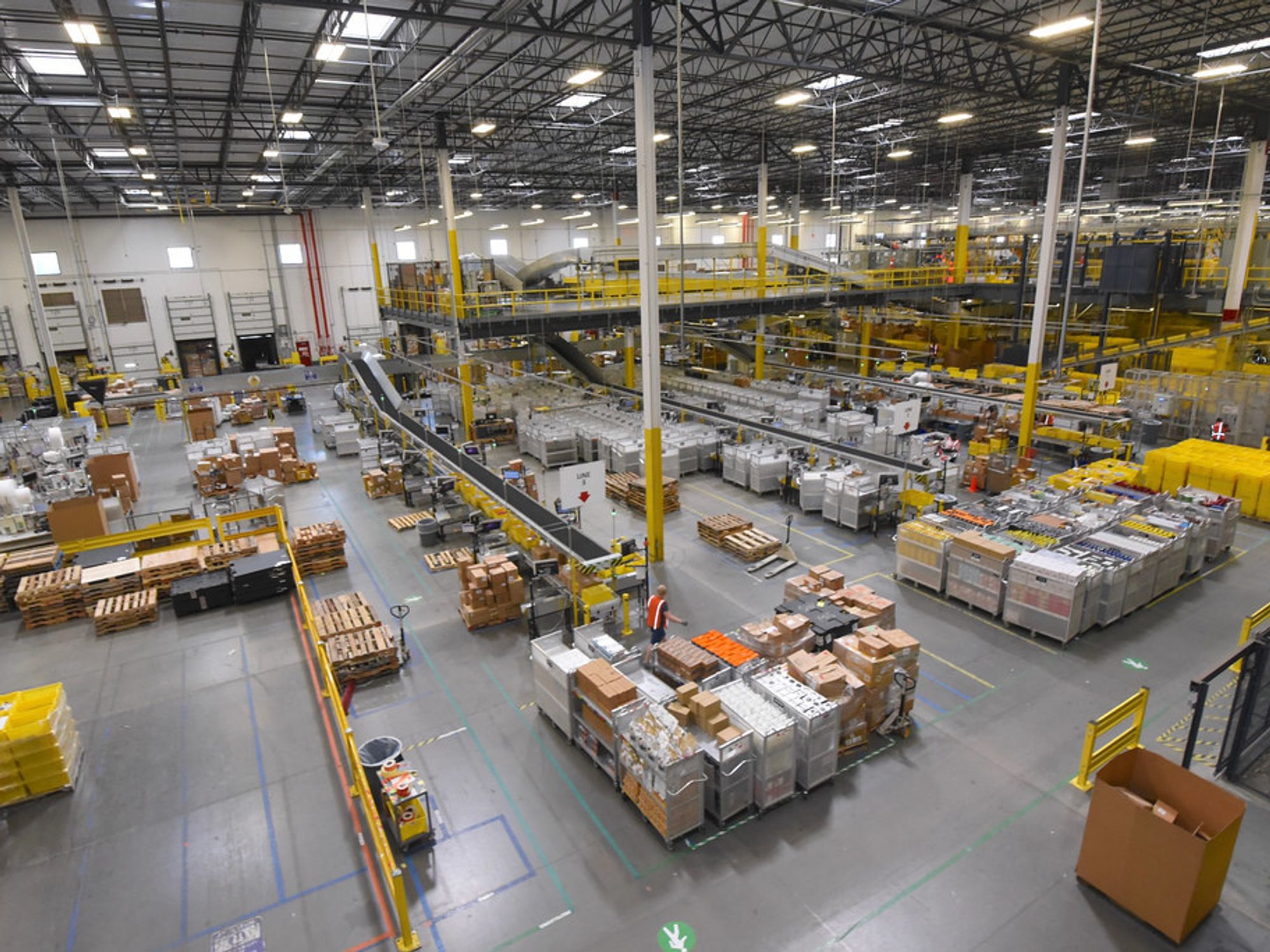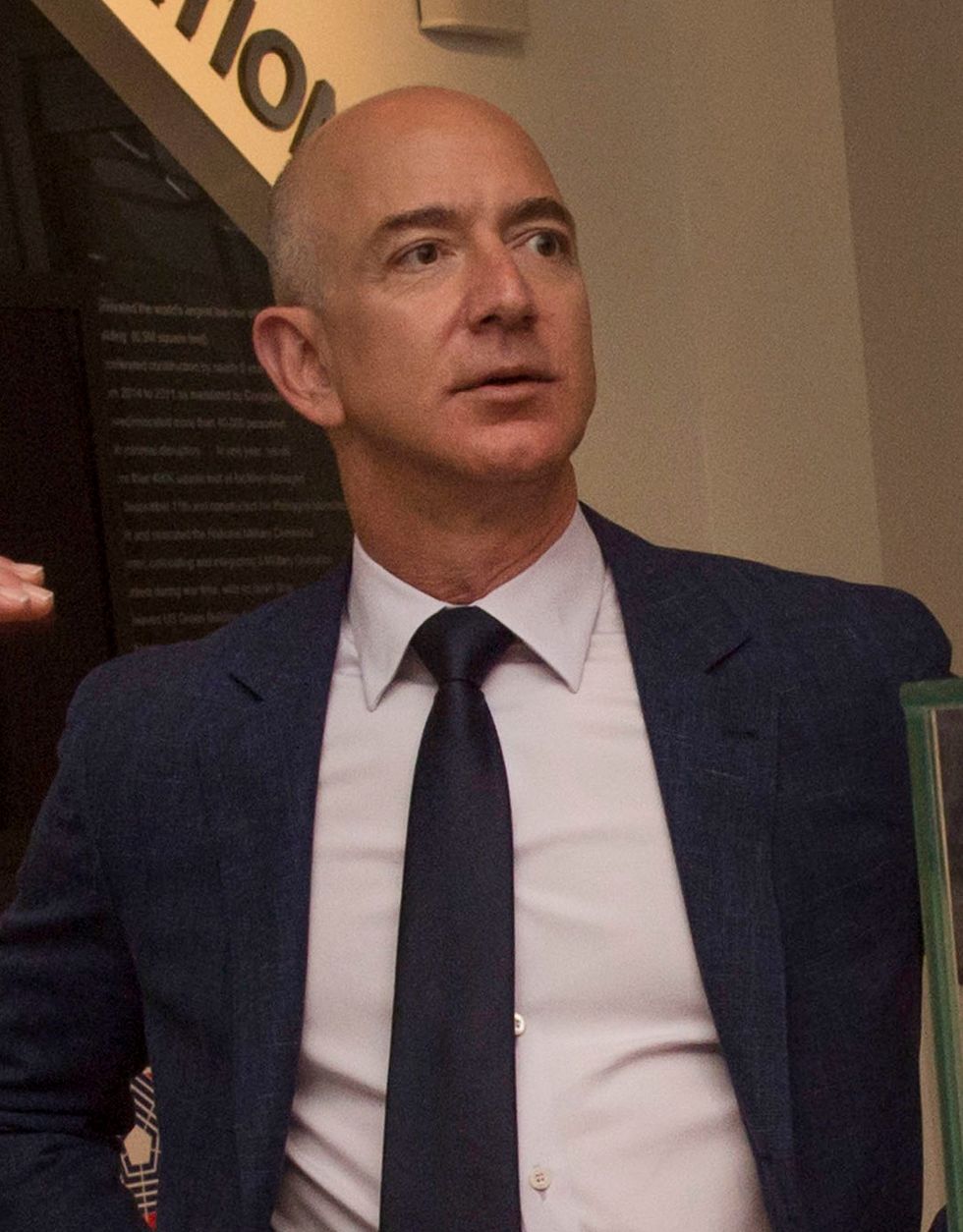Amazon Warehouse Worker in L.A. Tests Positive, As Company Struggles with Covid-19

At least 30 of the fulfillment centers that power Amazon's e-commerce business have outbreaks of COVID-19, according to news reports and employee accounts. The most recent case in Los Angeles was reported Wednesday, when Amazon confirmed to City News Service that an employee at their warehouse in Atwater Village has tested positive for COVID-19. The mounting cases are sparking walkouts, frustration, and an unprecedented challenge for a tech company that finds itself at the center of the coronavirus pandemic.
Amazon says it is going to great lengths to protect employees on the front lines, but current and former workers who spoke with GeekWire for this story say its statements don't always match the experience on the warehouse floor. Employee concerns bubbled over in the form of walkouts at fulfillment centers in New York, Chicago, and Detroit this week, with workers demanding Amazon shut down facilities with confirmed cases for thorough cleaning.
The outbreaks and employee unrest come at a time when Amazon desperately needs all hands on deck. The company has been fielding a massive surge in orders in the weeks since the virus gained a foothold in the country. Many shipments are delayed, and consumers across the U.S. are unable to order groceries through the Amazon Fresh service.
Amazon executives are now navigating the responsibility of supplying thousands of Americans under isolation orders with items they need, mitigating virus outbreaks across their facilities, and keeping a worldwide delivery and logistics engine humming during a pandemic.
Meanwhile, workers in Amazon warehouses are facing difficult decisions and trade-offs of their own.
Inside Amazon warehouses
Frank Eliason works at an Amazon fulfillment center in New Jersey where two of his co-workers have tested positive for COVID-19. The 47-year-old is considered at-risk for the disease because he has diabetes. He also has two daughters at home who he worries about infecting.
"Employees are scared," he said. "I am scared. I do not want to bring this to my family. This is an unprecedented event. There is no playbook for employees or companies."
Amazon would not say how many warehouses have COVID-19 cases, but local news reports and a running list tracked in a private employee Facebook group indicate at least 30 of Amazon's 175 fulfillment centers are affected. Workers at several Amazon warehouses are organizing walkouts to demand that the company temporarily close facilities for cleaning. It's a position backed by Amazon Employees for Climate Justice, an activism group created by mostly white-collar workers at the company's Seattle headquarters.

"To be honest, every facility that has positive cases in them need to be shut down and cleaned inside and out," said one Oklahoma City worker who asked not to be identified because he is concerned about retaliation from Amazon.
Amazon employees at a fulfillment center in Staten Island made the same demand when they walked off the job on Monday. Amazon fired the organizer of the demonstration, Christian Smalls, claiming he put his colleagues at risk by breaking quarantine. The New York protest was one of several around the country organized by increasingly uneasy Amazon warehouse workers.
"I am sitting here right now trying to decide if today is the day I will get sick," Eliason said. "Do I really want to go in? It is a question I ponder each day."
Eliason said he supports Amazon's decision to fire Smalls, "assuming the employee who was fired was asked to quarantine with pay. I worry each day of people coming in knowingly or unknowingly are sick."
Amazon consults with public health officials and medical experts when deciding whether to shut down a contaminated warehouse, according to spokesperson Timothy Carter.
"Our process also evaluates where the employee was in the building, for how long, how much time has passed since they were onsite, and who they interacted with, among other items," he said in a statement. "If someone hasn't been at the building for quite some time, they were onsite only briefly, or the area they were in was already deep cleaned several times as a regular course of business, we may not need to close."
Amazon's new protocol
Amazon has made more than 150 "significant process changes" in response to the COVID-19 outbreak, according to a blog post by worldwide operations CEO Dave Clark.
On Sunday, Amazon started screening employee temperatures at warehouses in New York and the Seattle area, sending anyone who registers above 100.4 degrees home. Clark said Amazon will roll out temperature screening across its facilities, including Whole Foods stores, next week.
Amazon expanded its sick policies, providing two weeks paid time off for employees who test positive for COVID-19 or are asked to quarantine due to exposure. The company is also offering unlimited unpaid time off to all employees.Clark said that disinfectant wipes and hand sanitizer are readily available in all fulfillment centers, though some workers say they do not have access to those supplies.
"They're not supplying us with the proper PPE or cleaning products to ensure that our areas are cleaned after every shift," said the Oklahoma City worker who asked to remain anonymous. "I have been bringing my own Lysol to ensure my area is cleaned. We were told each department and station would have their own products to clean. Nothing has shown up."
There is a global shortage of personal protective gear (PPE) that even Amazon's vast supply chain has struggled to fill. Amazon ordered millions of masks for fulfillment center employees weeks ago and those supplies are starting to arrive, according to Clark. Any N-95 masks that are critical for healthcare workers will be donated or sold to medical providers at cost. Amazon is requiring warehouse workers to maintain a distance of at least six feet from one another and has canceled daily stand-up meetings which bring employees into close proximity with each other.
It's difficult to conceptualize the sheer size of an Amazon fulfillment center, which can range from 400,000 to 1 million square feet. A typical Amazon warehouse is comparable to 10 football fields lined up.
"Cleaning and sanitizing of an entire warehouse (let alone multiple warehouses) seems incredibly daunting," said Scott Meschke, a microbiologist specializing in pathogens at the University of Washington's occupational health sciences department, in an email.
The Centers for Disease Control do not have specific cleaning guidelines for warehouses, but recommend other facilities close off areas visited by infected people, ventilate, and "wait 24 hours or as long as practical before beginning cleaning and disinfection."
"A potential problem with shutting a facility for cleaning is that in the absence of a more holistic plan to control spread, the likelihood is that contamination may be reintroduced by infected workers," Meschke said.
A lifeline in isolation
Washington, California, New York, and other jurisdictions across the country have implemented mandatory isolation orders, compelling thousands of consumers to turn to online shopping when they might've otherwise visited a store.
Last month, Amazon announced plans to hire 100,000 new warehouse workers to cover for sick employees and respond to the surge in orders from customers practicing social distancing. Clark said Thursday that the company has already hired 80,000.
Analysts at Jefferies conducted two surveys of about 630 U.S. adults on March 10 and March 27 that show how the pandemic is influencing demand for Amazon's products and delivery horsepower. Amazon was the only online retailer that saw consumers increasing their spending, according to the surveys. The percentage of consumers who said they are spending more on Amazon jumped from 14 percent to 34 percent. Consumers are spending less on other sites, like eBay, Chewy, and Etsy, according to the analysis.
Though the shift to online shopping is nothing new, its acceleration due to the pandemic has been disastrous for brick-and-mortar retail. Nordstrom, Macy's, Kohl's and others are shuttering stores and furloughing employees as traditional shopping grinds to a halt. The broad social distancing orders driving this trend are temporary, but the shift to online shopping may not be.
"This is not simply predicated on a one-time bump in the first and second quarter as consumers have been forced to stay home … we believe the current backdrop provides for incremental comfort and awareness of purchasing basic goods at home, which will have [a] lasting impact," write analysts at William Blair.
But the surge in demand may not be the financial buoy for Amazon that it appears to be at first glance. Amazon is spending more than $350 million on its response to the pandemic, according to Clark.
"We expect to go well beyond our initial $350 million investment in additional pay, and we will do so happily," he said.
Amazon increased its minimum warehouse wages by $2 to $17 per hour last month and fulfillment centers temporarily stopped accepting shipments of non-essential items so that the company can restock household goods and medical supplies.
"This could be a headwind for Amazon, partially offset by greater-than-expected demand in grocery items and other staples, including health-related items," wrote Mark Mahaney, an analyst with RBC Capital Markets. That firm lowered its revenue estimates for Amazon this year due to the impact of the coronavirus.
Still, Mahaney believes "Amazon is better positioned than most other names in our coverage universe to weather this macro uncertainty given the diversity of its business."
The sprawling Amazon empire includes its lucrative cloud arm, growing advertising business, and grocery store chain.
Amazon's relative resilience could reshape the e-commerce landscape when the coronavirus threat passes. Millions of Americans are reporting job losses at a time when Amazon is hiring. Retail stores are shutting down at a time when Amazon's demand is surging. Though the tech giant is not immune to economic turmoil, it could come out of the crisis in a more dominant position than before.
This story originally appeared on GeekWire.
- The definitive account of Amazon's perilous ambition: Key scenes ... ›
- Coronavirus Test Kit Facility Aims to Produce 10K A Day in L.A. - dot ... ›
- L.A.-Based Lambs Shifts to Making Silver-Lined Face Mask - dot.LA ›
- Amazon Reportedly Eyes Sears, J.C. Penny Stores - dot.LA ›
- Amazon Is Hiring More Than 800 Workers in LA - dot.LA ›
- Amazon Acquires One Medical for $3.9 Billion - dot.LA ›
- Positive Food Company's Alternative to Meal Delivery - dot.LA ›





 Image Source: Skyryse
Image Source: Skyryse